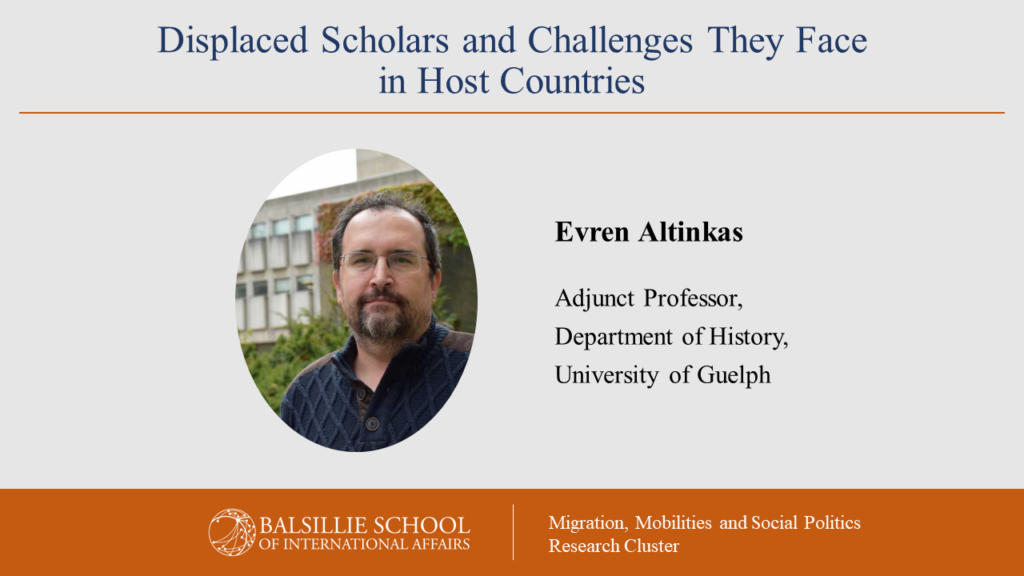There are networks like SAR that provide assistance to those scholars who are “at-risk” or “threatened” and usually the process ends with relocation of the scholar to a safe “host country”. This is a noble intervention and aims to protect the academic integrity of those scholars, boosting their academic careers and providing them a safe zone where they can continue with their academic work.
What happens to these scholars when their placement ends? None of the networks that facilitate the at-risk scholars’ arrival can guarantee their permanent stay in the host countries, which is not among the goals of these programs. However, the authoritarian regimes in the home countries where these scholars come from (e.g. Turkey, Syria, Afghanistan, Venezuela, China, Iran, Iraq, Yemen etc.) are not very “welcoming” towards them upon the end of their placement. As a result of this, “at-risk scholars” get a new title after their initial placement under such networks end: “Displaced Scholar”.
These academics are either directed to positions focused solely on teaching as part-time instructors after their first placement in the countries they came from as part of the “at-risk scholars” programs, or they sometimes restart their education just to find a suitable position in these countries. The competitive and unfortunately label-driven nature of the academic market, particularly in North America, poses an extremely serious risk to displaced scholars. In addition to all these, academics who cannot complete the necessary procedures to stay or work continuously in the country they live in during their initial placement, which is usually limited to 2 years, also face the risk of deportation, which may result in their return to the country they came from. In addition to all these, scholars who have limited academic publication due to reasons such as adapting to the academic environment they have just arrived in, preparing for the courses they need to teach which are sometimes outside their field of expertise are at a disadvantage in the competitive academic market I mentioned above. Again, considering that many academic positions in North America and Europe, where their initial placements were made, depend on external grants and that many grant proposals depend on research priorities and grant submission processes of government funding agencies, the dimensions of the risk I mentioned become more understandable.
Displaced scholars who are faced with these risks have to be exposed to processes such as unemployment or the obligation to turn to professions unrelated with their qualifications, although they are kept away from problems such as pressure and threats in their home country. Although “diversity and equity”, which is frequently used in academic advertisements, seems promising, unfortunately, “displaced scholars” are not included in the definitions or postulations made within the scope of “underrepresented groups” in terms of the internal dynamics of North America and Europe. Displaced scholars usually hesitate to state that they came to these countries as “at-risk scholars” and are now “displaced scholars” in cover letters and resumes they use in job applications; and even if they stated this, Hiring Committees have no information about this process. They are even more disadvantaged in the already competitive academic market due to the fact that they are eliminated without even questioning the reasons for the employment gap they experienced in their careers.
About the speaker
Evren Altinkas received postgraduate degrees from King’s College London in 2000 and from Dokuz Eylul University in 2003. He obtained his doctoral degree from Dokuz Eylul University in 2011 based on his dissertation comparing the development of the concept of intellectuals in Europe and in Ottoman State/Turkey. Between 2018-2022, Altinkas served as an Assistant Professor in the Department of History, University of Guelph. Currently, Altinkas is an Adjunct Professor in the same department, teaching as a part-time lecturer in several universities including the University of Guelph, Wilfrid Laurier University and Trent University. His research areas are the History of the Middle East, Turkish History, Intellectual History and the Transformation from Ottoman Empire to Modern Middle East and Turkey. He received the Chevening Scholarship for the academic year of 1999-2000, and was a MESA Global Academy Fellow for the academic years 2020-2021 and 2021-2022. Altinkas is an editor of H-TURK. Dr. Altinkas has several academic articles and book chapters published and has 3 articles about the Turkish War of Independence and the Unionist connection in publication progress as of January 2023.

